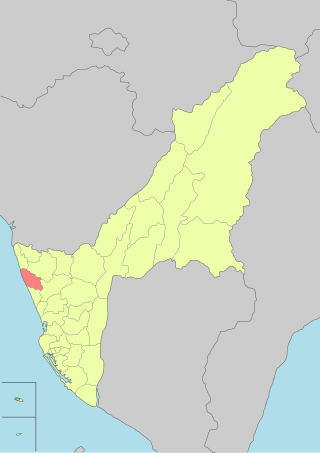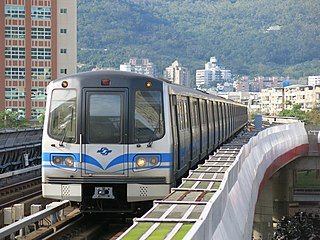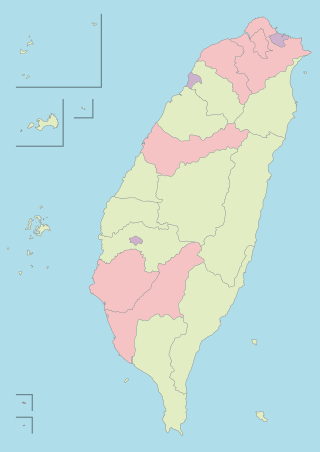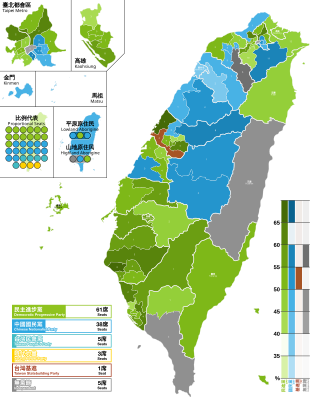The Legislative Yuan is the unicameral legislature of the Republic of China (Taiwan), currently with 113 seats, down from the previous 225 in 1998.
73 are directly elected in local single-member districts by the citizens residing in the free area of the Republic of China. [1] 6 seats are elected by indigenous peoples voters in two three-member constituencies. 34 are elected on nationwide party-list.
Prior to the Kuomintang's defeat in Mainland China to the Chinese Communist Party in 1949, there were 759 seats in the Legislative Yuan.
Starting from the 1992 legislative election, the second Legislative Yuan had 161 members elected from the Taiwan Area of the Republic of China, 119 from 27 multi-member constituencies, 6 from indigenous constituencies, 6 from overseas constituencies and 30 elected on nationwide party-list.
In 1995, the number of seats from the multi-member constituencies was increased to 122.
In 1998, the number of seats was further increased to 225, 168 from 29 multi-member constituencies, 8 from indigenous constituencies, 8 from overseas constituencies and 41 elected on nationwide party-list.

The Legislative Yuan is the unicameral legislature of the Republic of China (Taiwan) located in Taipei. The Legislative Yuan is composed of 113 members, who are directly elected for four-year terms by people of the Taiwan Area through a parallel voting system.
In Taiwan, parliamentary elections are held every four years to elect the 113 members of the Legislative Yuan, the unicameral legislature of Taiwan. The current electoral system was introduced in 2008. The constitutional amendments of 2005 extended term length from three to four years, reduced seat count from 225 to 113, and abolished the National Assembly, originally another governmental organ equivalent to a chamber of parliament.

Legislative elections were held in Taiwan on 12 January 2008 to elect the members of the Legislative Yuan. It was the first Legislative Yuan election after the constitutional amendments of 2005, which extended term length from three to four years, reduced seat count from 225 to 113, and introduced the current electoral system.
Legislative elections were held in Taiwan on 2 December 1989 to elect members of the Legislative Yuan.
The law of the Republic of China as applied in Taiwan, Penghu, Kinmen, and Matsu is based on civil law with its origins in the modern Japanese and German legal systems. The main body of laws are codified into the Six Codes:

Hunei District is a rural district in Kaohsiung City, Taiwan.

Mituo District is a rural district of Kaohsiung City in southern Taiwan.

Yongan District is a coastal suburban district of Kaohsiung City in southern Taiwan.

The following outline is provided as an overview of and topical guide to Taiwan:

The Ministry of Transportation and Communications governs transportation in Taiwan.
The Taiwan High Prosecutors Office is located in Taipei, Taiwan. It has branch offices in Taipei, Taichung, Tainan, Kaohsiung and Hualien. It is one of the two high prosecutors offices in Taiwan.
Districts are administrative subdivisions of Taiwan's special municipalities of the second level and provincial cities of the third level formerly under its provinces. There are two types of district in the administrative scheme:
Events from the year 2010 in Taiwan, Republic of China. This year is numbered Minguo 99 according to the official Republic of China calendar.
Events from the year 1950 in Taiwan, Republic of China. This year is numbered Minguo 39 according to the official Republic of China calendar.

Special municipality, historically known as Yuan-controlled municipality, is a first-level administrative division unit in Taiwan. It is the highest level of the country's administrative structure and is equivalent to a province. After the suspension of the provincial governments of 2018, the special municipalities along with provincial cities and counties have all governed directly under the central government.
Events from the year 2014 in Taiwan, Republic of China. This year is numbered Minguo 103 according to the official Republic of China calendar.

Legislative elections were held in Taiwan on 11 January 2020 for all 113 seats to the Legislative Yuan concurrently with the 15th presidential election. The term of the Legislative Yuan began on 1 February 2020.
Taichung City electoral constituencies consist of 8 single-member constituencies, each represented by a member of the Republic of China Legislative Yuan.
Taoyuan City electoral constituencies consist of 6 single-member constituencies in Taoyuan, Taiwan, each represented by a member of the Republic of China Legislative Yuan.

Chen Po-wei is a Taiwanese politician. He was the first ever Taiwan Statebuilding Party candidate to be elected to the Legislative Yuan, defeating Kuomintang incumbent Yen Kuan-heng in the 2020 Taiwanese legislative election. In October 2021, Chen became the first member of the Legislative Yuan to lose his office via a successful recall election.